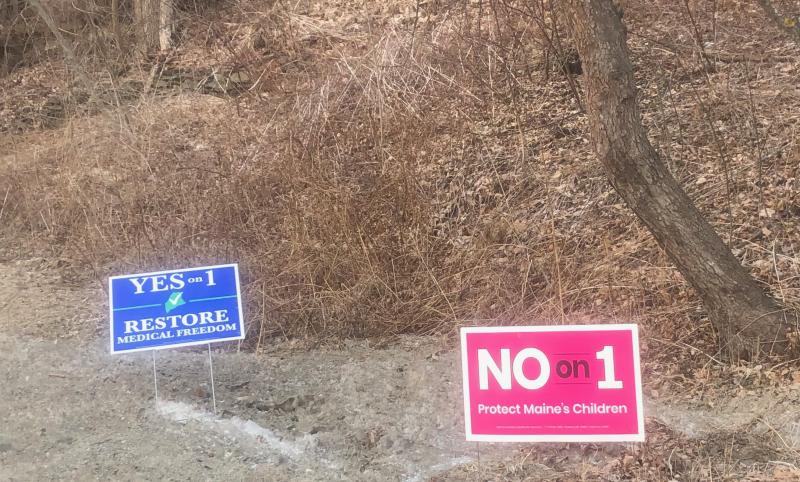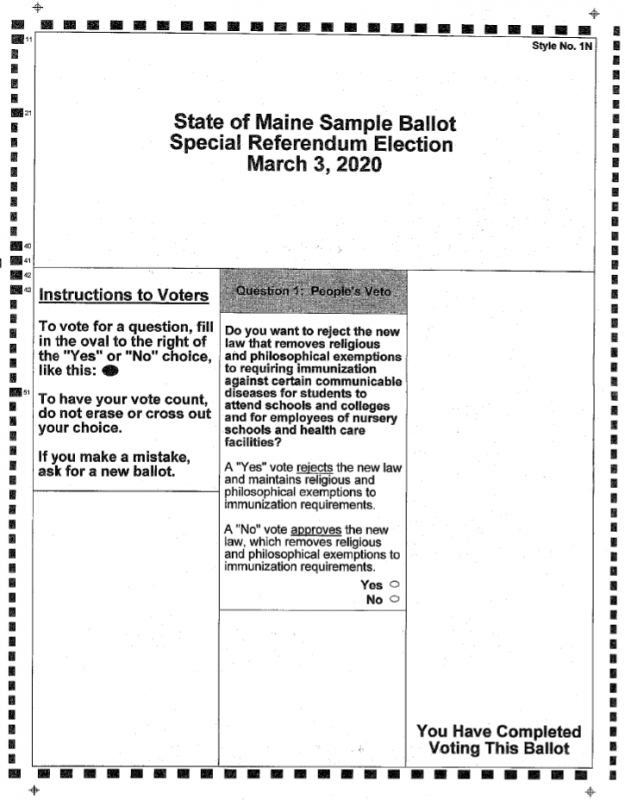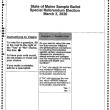Eight area legislators’ share thoughts on vaccine immunization law
AUGUSTA — Voters around the state heading to the polls Tuesday, March 3, will vote on a people’s veto state referendum question on whether a bill signed into law last year by Governor Janet Mills should be repealed.
The question on the ballot reads: Do you want to reject the new law that removes religious and philosophical exemptions to requiring immunization against certain communicable diseases for students to attend schools and colleges and for employees of nursery schools and health care facilities?
To provide insight into why local legislators voted on the bill the way they did, penbaypilot.com asked each of the area’s 14 legislators to provide a statement on the reasoning behind their vote.
Below are the statements we received, posted verbatim.
Despite multiple requests for a statement, Sen. Erin Herbig (Senate District 11), Sen. Dana Dow (Senate District 13), Rep. William Pluecker (House District 95), Rep. MaryAnne Kinney (House District 99), Rep. Pinny Beebe-Center (House District 93) and Rep. Sherman Hutchins (House District 131) did not provide a statement.
Rep. Janice S. Dodge (D-Belfast, House District 97)
I know vaccinations feel very personal to many. Throughout hours of testimony as I sat on the Education Committee that considered this bill, I heard hundreds of impassioned arguments both for and against LD 798. I have also attended community meetings, films and discussion sessions.
The primary objective is to keep preventable diseases out of Maine schools. My vote came down to ensuring the greater good and the health of our school communities. We simply should not allow students to be subjected to preventable diseases. As a legislator, my goal is to protect the health of as many Maine citizens as possible and that is what this law accomplishes.
Rep. Ann Matlack (D-St. George, House District 92)
I voted in support of LD 798 when it came before the House last year. Vaccines are a safe and effective way to prevent the spread of preventable diseases and a successful public health measure. Vaccines protect the health of those children who are vaccinated and also, through community immunity, those who cannot be vaccinated due to their age or their compromised immune systems.
Rep. Victoria Doudera (D-Camden, House District 94)
While the immunization dialogue raises important and valid questions of health, religion and freedom of choice, I have to view this law (LD 798) from the lens of public health. As I write this, seventeen Mainers have died, nearly 5000 have tested positive, and 277 have been hospitalized due to the ongoing outbreaks of two strains of influenza raging across our state.
Who are the most vulnerable when we don't get an annual flu shot? Pediatric patients, the elderly, and those with compromised immune systems. It's no different with diseases such as measles, mumps, polio and diphtheria. While deadly and virulent, just like the flu, outbreaks of these diseases are preventable through vaccinations.
I have met young children and teens whose medical conditions prevent them from getting immunized. They depend on “herd” or community immunity for their very survival. LD 798 protects the health of these folks and as many Mainers as possible by limiting the spread of diseases and providing medical exemptions when immunizations are not possible. I will vote “no” on Question 1 to keep the law in place.
Rep. Stanley Paige Zeigler (D-Montville, House District 96)
The conversation around immunizations is incredibly complex. Taken separately, the topics of health, religion and personal choice are some of our most important yet complicated issues. Taken together, there are even more factors to consider and conversations to be had.
For me, this law comes down to health. We must protect the health of as many Mainers as we possibly can. I feel strongly that this law does just that. It limits the chance of diseases being transmitted, and it provides medical exemptions when an immunization is not safe for an individual.
Rep. Genevieve McDonald (D-Stonington, House District 134)
I do not support allowing the reintroduction of dangerous preventable diseases into our schools and communities.
Public Law 154 is not a mandate. Parents are free to choose not to vaccinate and seek an alternative method of education for their children. And parents can still follow a delayed schedule as long as their child has the necessary immunizations by the time they start school.
Our current system of allowing exemptions is not working. Vaccination rates are falling, and when too many people opt out based on their personal beliefs it puts our community immunity at risk. The burden of someone’s personal beliefs should not rest on the shoulders of those who are too young or medically unable to receive vaccines.
Medical exemptions remain widely available. Licensed physicians, nurse practitioners, and physician assistants are free to determine, based on their medical judgment, which of the required vaccines a child should, or should not receive.
Maine law requires K-12 students be immunized for nine diseases:
• Diphtheria
• Tetanus
• Pertussis
• Measles
• Mumps
• Rubella
• Chicken pox
• Meningitis
• Polio
The flu shot and HPV vaccine are not included in the Maine Department of Education immunization requirements. For additional vaccines to be added, the law would have to go back before a review of the Legislature and another public hearing process.
I supported this legislation as a lawmaker, and on March 3rd will be voting NO as a citizen and parent against the repeal.
Rep. Jeffrey Evangelos (I-Friendship, House District 91)
I voted to support LD-798 and will not be supporting efforts to repeal it. My views on vaccines are shaped by my history. Born in 1952, when polio cases reached 58,000 new cases, our parents were experiencing a nightmare of worry, witnessing children in Iron Lung machines, braces, crippled for life, and the death of some youngsters, 3000 in 1952 alone. Along came Dr. Jonas Salk who perfected a vaccine to save us, and he did, starting in 1955, when inoculations began. Our World War 2 parents lined us up at school in 1957, told us to shut up and stop crying because the needle hurt. We didn't have a choice. The plan worked. By 1962, there only 200 cases of polio. We experienced similar results with measles. In 1958, there were 760,000 cases. In 1963 a vaccine was licensed and in ten years measles cases dropped by nearly 90%.
Last year when the Legislature passed LD-798, I fought hard to ensure the bill included a strong medical exception whereby children with compromised immune systems and other medical conditions had the option of having their doctor write an exemption statement. I still support medical exemptions in these circumstances. In closing, I support science, and when science supports an exemption, I support a parent's right to exercise this option when their physician backs them up.
Lastly, the recent worldwide outbreak of the Coronavirus should be a stark reminder and warning that we are never out of the woods on threats to human health. While I will fight to protect the rights of a small minority to opt out for health reasons, I will remain mindful of our history and will continue to support the science that has saved millions of lives.
Rep. Scott Cuddy (D-Winterport, House District 98)
In Maine today, many people are exempting their children from the statewide vaccination requirements needed to attend school. We have reached the point where those exemptions are putting the health of our communities in danger. Once vaccination rates fall below 95%, our people are put at risk. Currently, more than half of the schools in the state are below 95%.
I support people’s rights to decide how they live their lives. But when the exercise of those rights impacts the health and wellbeing of the community at-large, we have to create spaces, especially schools, that protect our most vulnerable citizens. It was a hard vote, but having heard from survivors of polio and other vaccine preventable diseases, I felt it was my responsibility to vote to protect our communities from diseases.
Sen. David Miramant (D-Camden, Senate District 12)
My passion for vaccine safety comes from meeting the many families with vaccine-injured children who filled the halls of the State House. In fact, one of my colleagues Senator Foley is dedicated to creating a choice for a safe schedule for his 2 sons after losing his thriving baby daughter shortly after her being vaccinated. Over 80% of the folks who contacted me about this issue wanted to maintain the choice to be able to vaccinate on a schedule that did not harm their children. It became very clear that I need to be a voice for the children who can't speak, and for the parents who are desperate to protect their children.
I also understand the fears and concerns of people who want this choice removed. The problem is that the exemptions have been in place for decades and yet the vaccination compliance rate has achieved the herd immunity desired by the folks who want to vaccinate. We have an opportunity to provide ample protection for everyone with the existing level of vaccinations, and at the same time provide safe schedules for all the children who need them.
We have had no epidemics of any of the diseases targeted by vaccinations and the small outbreaks are usually among vaccinated children. They are usually caused by vaccinated children as well.
I want to protect as many of our children as possible and the way to do that in this modern age is to continue to allow exemptions. When the pharmaceutical industry was given immunity from responsibility for their vaccines, a review board called the Vaccine Injury Compensation Program was established to review claims regarding vaccination injuries. To date, they have awarded over 4 billion dollars.
With the drug companies and the Center for Disease Control calling for ever more new vaccines, and more injections of the ones they already require, it is time to look at the ways we can make the program safe for all of our children. When Congress called the vaccination program "unavoidably unsafe" there were far fewer vaccines and many fewer injuries. The U.S has adopted a schedule that more than doubles the number of injections by age 5 over any other country. It is time to think more critically about the program.
I will always strive to protect our communities and to give all children and parents the tools they need to make vaccinating safe. Yes on 1 will maintain that choice to protect all our children.
Event Date
Address
United States




























